New Mission & Vision
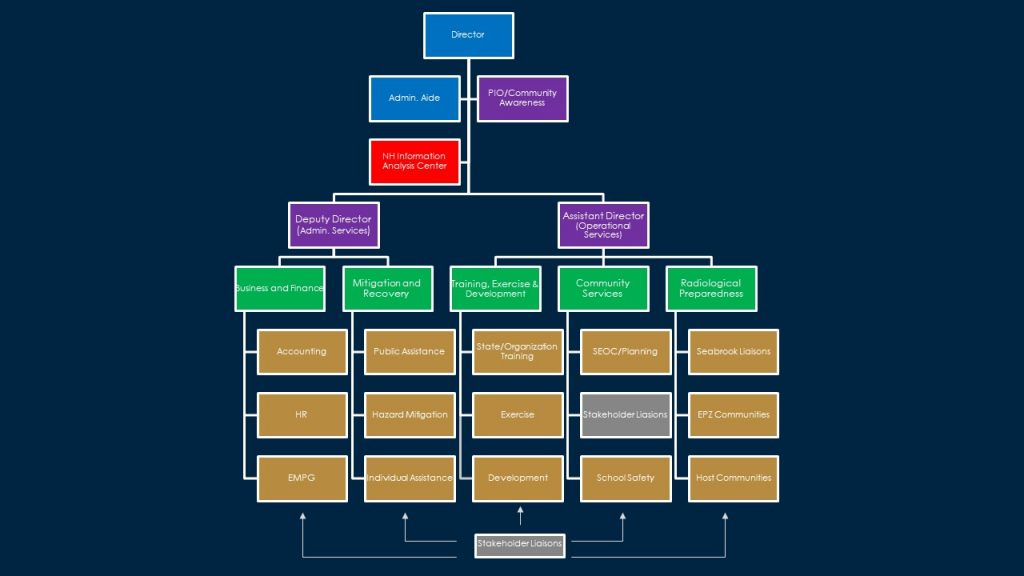
HSEM has begun to undergo an organizational restructuring in an effort to achieve the updated mission and vision laid out by Director Robert Buxton in a January general staff meeting.
New Vision: Create a culture of high touch customer service in the area of Homeland Security and Emergency Management. Creating a self-sustaining environment through the utilization of efficient mentoring, planning, teamwork, technology.
New Mission: To support the mission of the New Hampshire Department of Safety through the effective delivery of prevention, mitigation, preparedness, response, and recovery efforts for all hazards across the state of New Hampshire.
Preliminary Damage Assessments
and Disaster Declaration
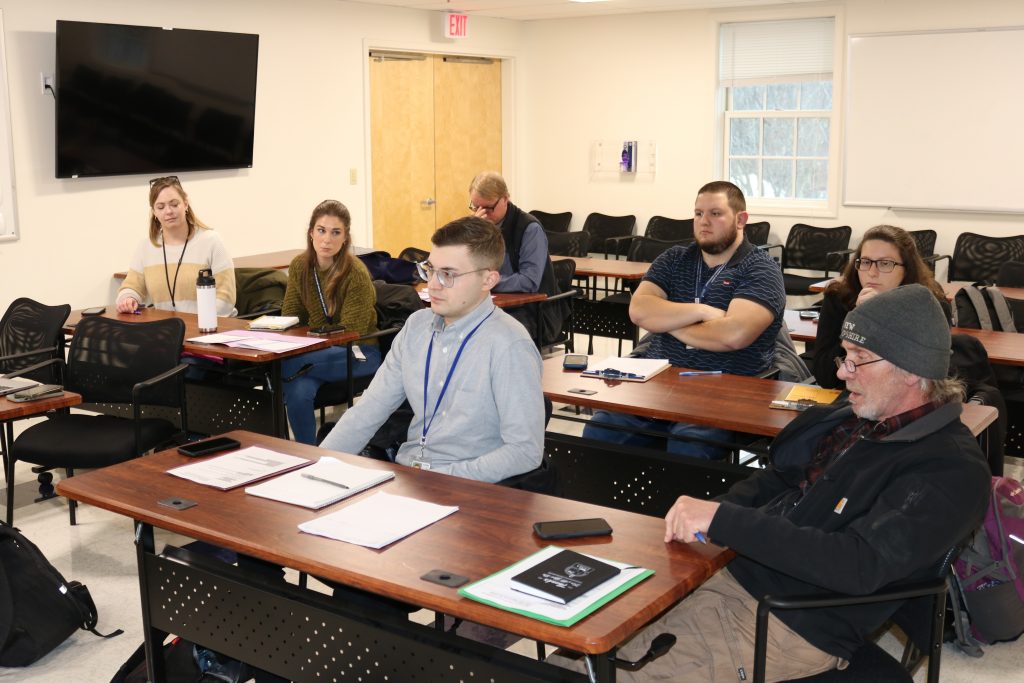

A severe storm featuring significant flash flooding and high winds struck the state from December 22-25, bringing major damage to state and local infrastructure and overwhelming state resources. At the storm’s peak, there were more than 130,000 power outages reported statewide, leading local communities to open warming shelters and emergency operations centers. This event led to numerous requests for state assistance. On January 18, HSEM, along with federal, state and local partners begin conducting preliminary damage assessments from the winter storm. At the conclusion of their assessments it was determined the cost of response efforts related to this event totaled $3,102,240.
On February 17, Gov. Chris Sununu requested the Biden administration to declare a major disaster for the state of New Hampshire. Sununu requested Belknap, Carroll, Coos and Grafton counties be granted a full designation for the Public Assistance Program. President Joe Biden granted this request March 15. The four counties included in the declaration are now in the process of securing federal assistance assistance.
“Communities now can start to work toward recovering costs from storm cleanup,” said Director Buxton. “We will continue to guide communities through the process of making repairs and mitigation projects to prevent similar problems in the future.”
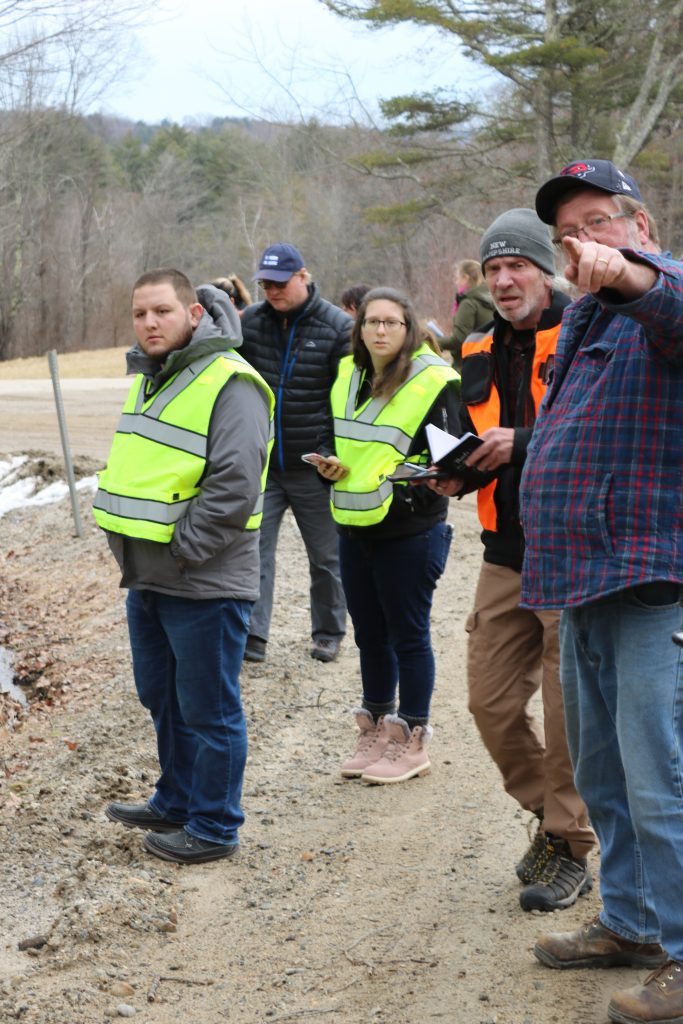

The President’s declaration makes federal support available through the Public Assistance Program and the Hazard Mitigation Grant Program on a cost-sharing basis. The purpose of the Hazard Mitigation Grant Program is to reduce the loss of life and property due to natural disasters and to enable the implementation of mitigation measures during the immediate recovery from a disaster. FEMA can fund up to 75 percent of the eligible costs of approved projects. The Public Assistance Program provides grants to state and local governments to assist with disaster recovery, including debris removal, emergency protective measures, and permanent restoration of infrastructure. Organizations that are eligible for receiving assistance include local, county and state agencies as well as nonprofits that provide critical services.
Houses of Worship
HSEM’s Training & Exercise program has several products available to New Hampshire’s faith communities, including three-hour emergency preparedness seminars, hate crimes workshops, tabletop exercises (TTX), and online two-hour topical presentations. Central to discussions are a focus on all-hazards preparedness and response, with priority intent to connect faith communities with their local first responders for further planning, conversation and exercises.
On March 5, HSEM’s Robert Christensen and Steven Cooper led an emergency preparedness seminar in front of faith leaders, administrators and board members at Temple Israel in Manchester. Alongside Jason Climer of the Cybersecurity and Infrastructure Security Agency (CISA), they discussed the importance of preparing for emergency situations in increasingly vulnerable locations such as houses of worship. This seminar was open to any New Hampshire resident interested in learning how to protect themselves in an emergency and the event drew a crowd of several dozen. The instructors led the group through the system of avoid, deny and defend, a technique critical for keeping oneself and others safe in a crisis situation. Participants also were taught the importance of having emergency plans in place and what to consider when constructing the plans. Afterword, many of the attendees reported feeling more confident in designing emergency plans for their communities with the knowledge they gained from the workshop.
For more information and resources for New Hampshire Houses of Worship, please visit: https://prd.blogs.nh.gov/dos/hsem/?page_id=5994. Additional questions can be emailed to exercisetraining@dos.nh.gov or by phone at (603) 271-2231.
Bartlett Elementary School

Ready the prepared puppy and his handlers visited Bartlett Elementary School on January 17. They put on a skit in front of several hundred kids ranging from the first to fourth grade. The children learned all about preparing for emergencies by knowing what to do and having what you need to stay safe. After his presentation, Ready joined the kids outside for recess. Ready made a lot of friends and even got to shoot some hoops with the children.
If you would like Ready the Prepared Puppy to visit your community or school, contact the HSEM Outreach Office at hsempio@dos.nh.gov or (603) 223-3647.
New Seabrook Station Brochures

Every year, Seabrook Station’s NextEra produces an emergency brochure with information and directions to protect people who live, work, visit or go to school within 10 miles of the nuclear power plant in Seabrook. Anyone with a business or residence within this 10 mile emergency preparedness zone (EPZ) receives an updated brochure at the start of the new year.
Prepared with the assistance of state and local officials, the guide contains important emergency planning information for people within the EPZ. The brochure details the four emergency classification levels and instructions to be followed in the event one is declared. It lists the ways in which residents, business and visitors may be notified of a potential event at Seabrook Station, what to do during an evacuation and where to go. Other valuable information includes guidance on pets, farm animals, parents who have children in school or child care and potassium iodide (KI).
March Winter Storm SEOC Activation
On March 14, a significant nor’easter brought over 2 feet of snow to parts of New Hampshire, with widespread power outages throughout much of the southern half of the state. The State Emergency Operations Center (SEOC) was partially activated on the morning of March 14 and stayed open until the evening of March 16. Heavy snow and wind gusts over 55 mph contributed to power outages totaling close over 75,000 customers at the event’s peak.
IPOC Tour
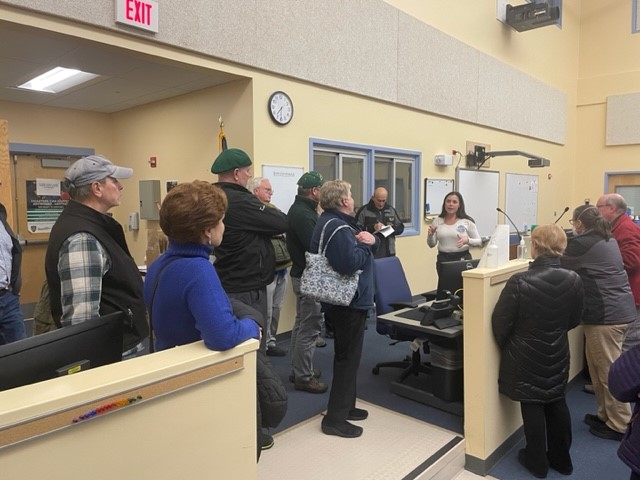
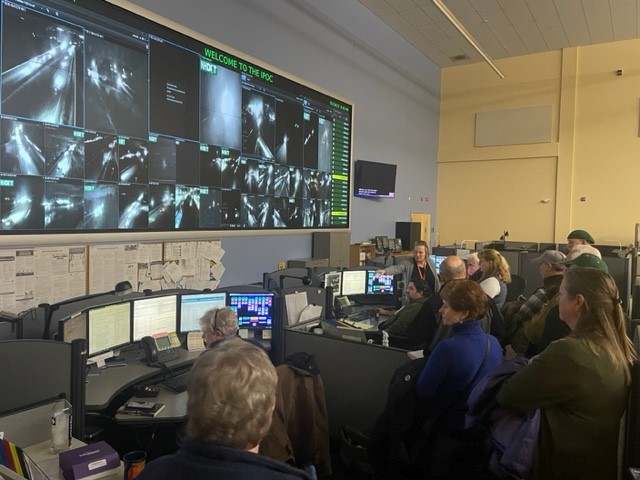
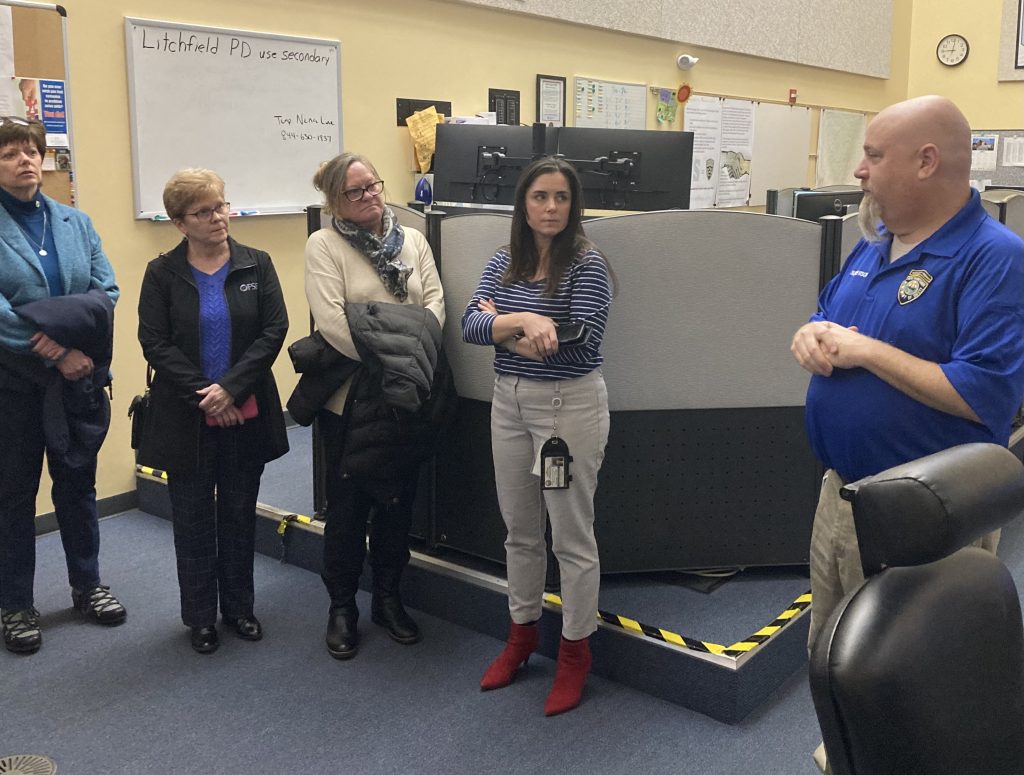
In January, HSEM PIO Vanessa Palalange gave a tour of the IPOC to a Community Emergency Response Team class from the Lakes and Capital regions. A similar tour was also given in March to members of Concord’s Rotary clubs. Attendees from both tours got the chance to observe the inside of the SEOC, Transportation Management Center (TMC), and the 911 Dispatch Center.
Volunteer organizations, services groups and school classes can book tours by emailing hsempio@dos.nh.gov.
Behavioral Threat Training
In September 2022, HSEM Assistant Chief of School Readiness Austin Brown and School Task Force Coordinator Katherine Partington attended the Master Trainer Program, along with several staff from the New Hampshire Information and Analysis Center. After a rigorous instructor evaluation process, these individuals became certified to instruct Behavioral Threat Assessment and Management (BTAM) techniques and best practices. This program is offered as part of the U.S. Department of Homeland Security’s National Threat Evaluation and Reporting Office. Instructors can present three different course offerings:
- Threat Evaluation and Reporting Overview (TERO) (3 hours)
- Basic Threat Evaluation and Reporting Course (1 day)
- Threat Evaluation and Reporting Course (3 days)
These courses are best suited for first responders, emergency management representatives and other local mental health resources that may be available. This effort was identified as a priority as part of the work that continues with the School Safety Preparedness Task Force. The first training was offered virtually in January 2023 to a post-secondary working group that was created as part of the School Safety Preparedness Task Force. Most recently, the TERO course was offered to 30 individuals from New Hampshire State Police Troop C, Keene State College, and the city of Keene.
If you are interested in learning more about these course offerings and bringing them to your community, please email the School Readiness Program at schoolreadiness@dos.nh.gov.
School Safety Task Force
On February 21, working groups from the Governor’s School Safety Preparedness Task Force met to go over existing recommendations and talk about the addition of new recommendations.
Two high school students presented to the group about the creation of a statewide student tip line, which was one of the original task force recommendations. The students had done several months of work speaking with schools and agencies across the state about best practices. One of their recommendations included making sure there is an emotional and mental wellness component to reporting a tip.
Work has begun on seven of the proposed 10 new initiatives. The three remaining were tabled because they already were covered under other recommendations.
Knights of Columbus Award
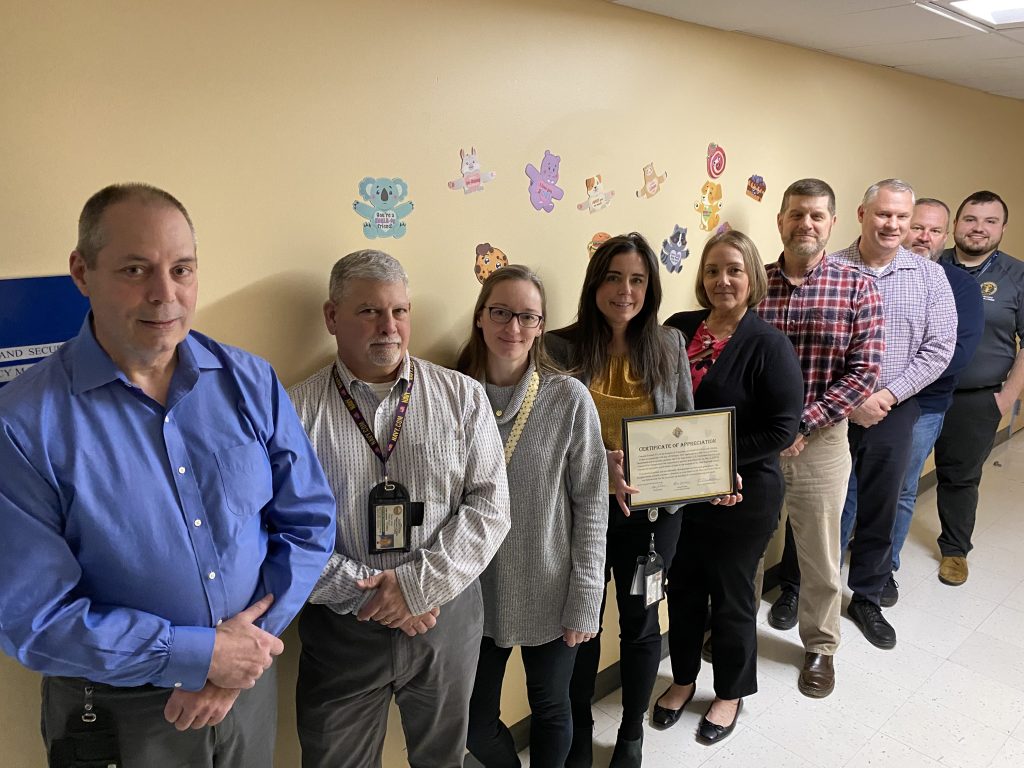
On December 8, HSEM received notifications of multiple active shooter threats at schools across the state. The calls, all similar in nature, were determined to be a hoax. Several communities across New Hampshire and the country reported receiving such calls in a trend known as “swatting.”
Although this event turned out to be a false alarm, it did showcase the effectiveness of various school districts’ abilities to use their emergency operation plans to respond to active shooter threats. Incidents like these show why it is important for schools to conduct trainings and exercises on such plans.
On February 14, the Knights of Columbus Council 112 and students from St. John Regional School presented Concord police, firefighters, state police, and representatives from HSEM with a certificate of appreciation as well as some Valentine’s Day cards during a Valentine’s Day ceremony at the Boys and Girls Club in Concord. The ceremony was done to recognize the quick and effective response to the hoax calls.
“First responders, even though the event December 8th was a false alarm, displayed brave and selfless service and deserve this honor today as well as our enduring appreciation,” said John Donovan, church activities director for the Knights of Columbus, according to an article in the Concord Monitor.
Laconia Tabletop Exercise


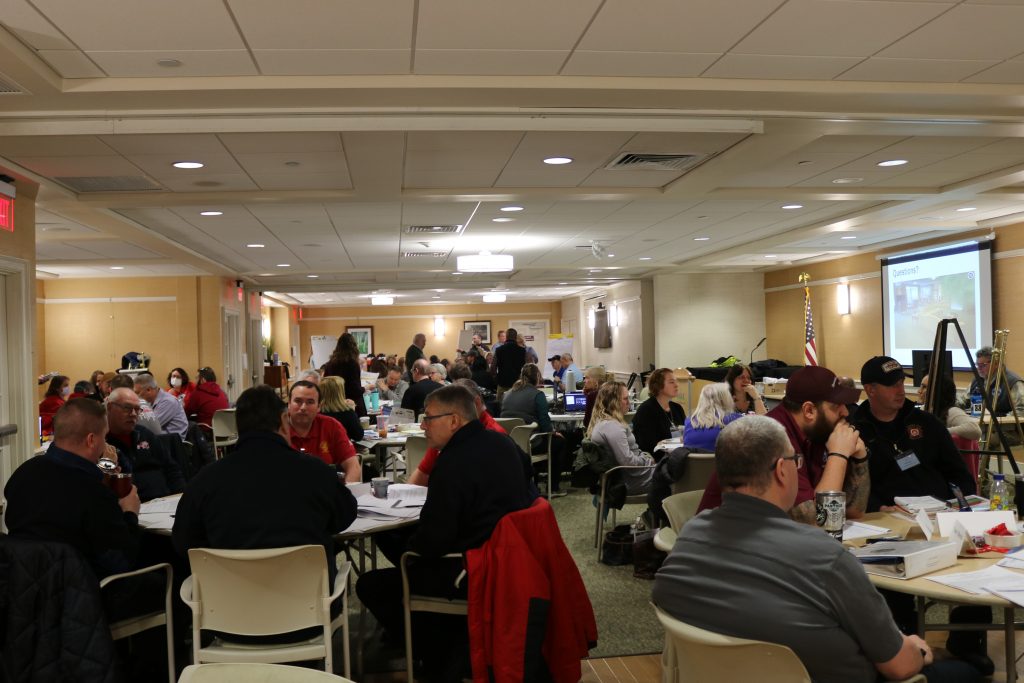
On January 27, the Training & Exercise Unit hosted a tabletop exercise at Taylor Community, a nonprofit continuing care retirement community in Laconia. HSEM, first responders, as well as several elderly care facilities from the surrounding towns participated in an exercise aimed at opening the lines of communication. The attendees worked together in assessing the hypothetical situation presented to them and began forming communication plans with one another. This allowed the different stakeholders to work out the kinks in their lines of communication among each other and with with first responders. As HSEM monitored the exercise throughout the day, many important conversations took place allowing the various groups the opportunity to make necessary adjustments for the future.
The Training & Exercise Unit can assist communities in the design, documentation, and facilitation of an exercise, as well as provide logistics, personnel, resource support, and grant funding. Communities can schedule training by emailing exercisetraining@dos.nh.gov.
CRASE Training
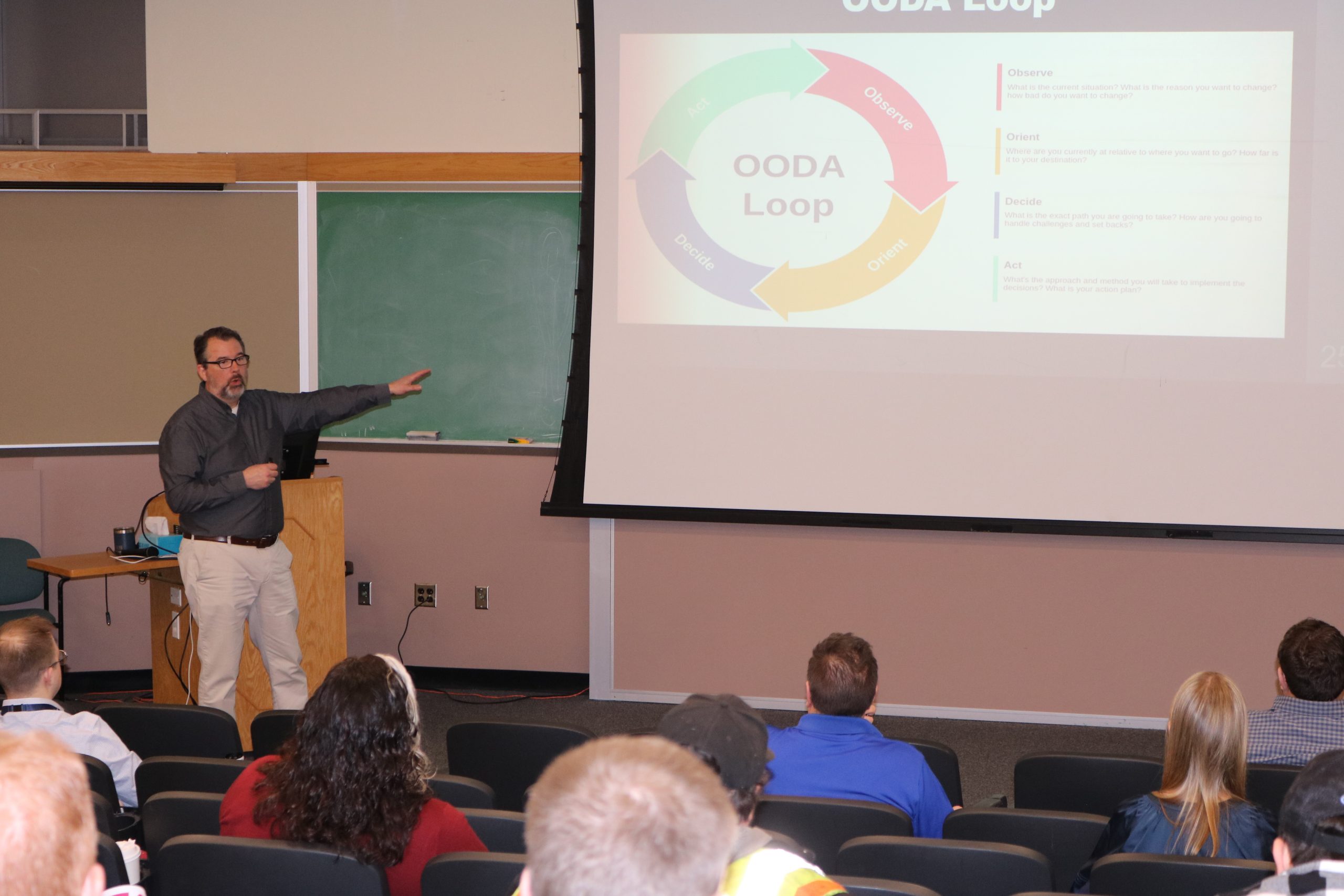
HSEM helped facilitate four Civilian Response to Active Shooter Events (C.R.A.S.E.) trainings this quarter: one at Concord state house in January, two at the Fire Academy in Concord in February and March and one in Keene in March. Developed by Texas State University in 2002, the Advanced Law Enforcement Rapid Response Training (ALERRT) program is designed around the avoid, deny, defend strategy and provides techniques, guidance, and plans on surviving an active shooter event.
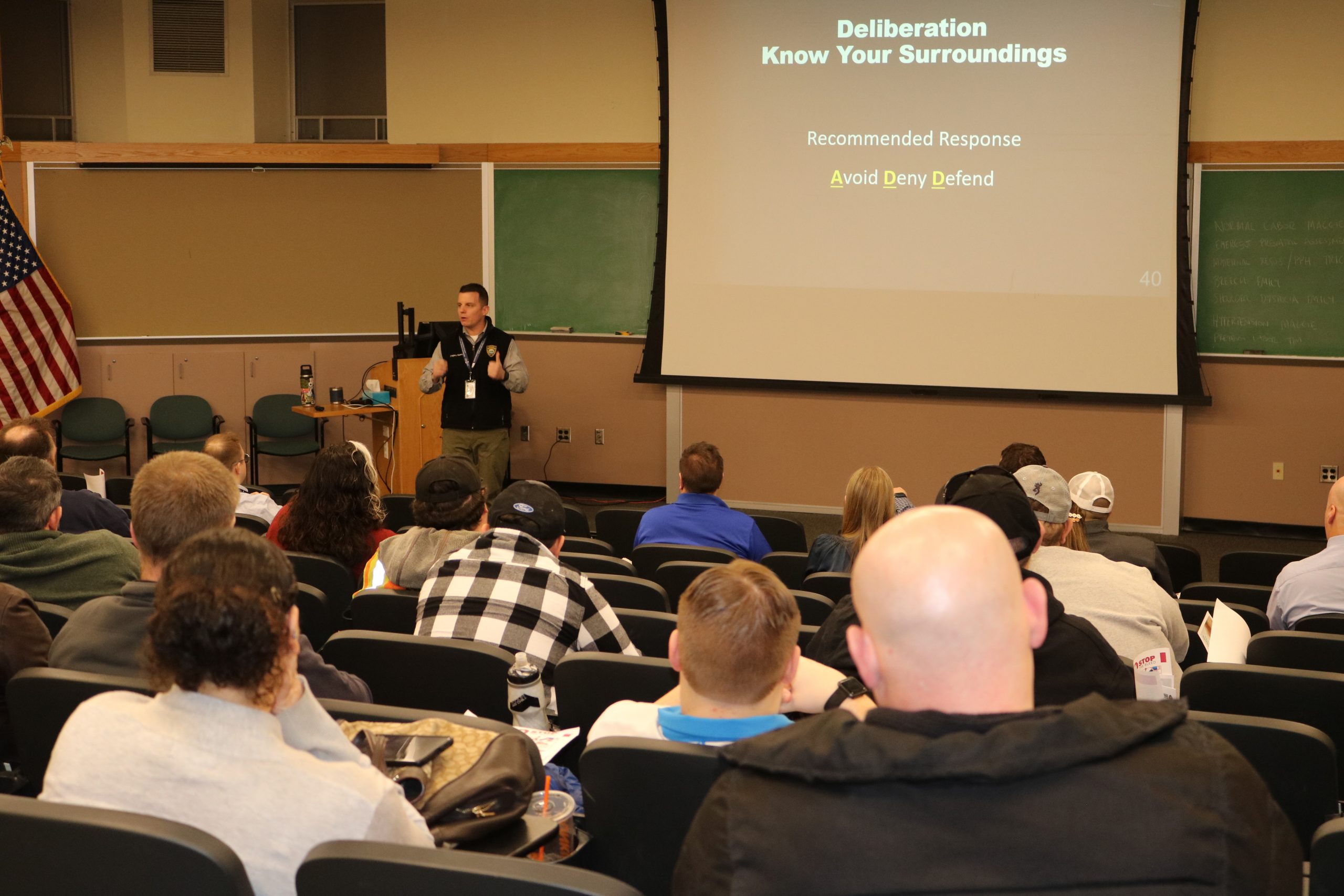
There are several more CRASE classes scheduled throughout the rest of the year. Anyone interested in additional information can email exercisetraining@dos.nh.gov or refer to the available training page on the HSEM resource center.
Career Fairs


During the first quarter, HSEM employees greeted students and alumni at the University of New Hampshire and Southern New Hampshire University.
At the fairs, we make connections with students from all majors to discuss internship and employment opportunities.
If you or someone you know is interested in a career with our division, our job postings can be found on the state’s employment portal or you can reach out to hsempio@dos.nh.gov for more information on open positions.
If you or someone you know is interested in an internship with our agency, applications are available on the HSEM Resource Center.
Upcoming Trainings
MGT-346: EOC Operations and Planning Course
NEW LOCATION 45 High Street, Nashua NH April 4-5, 2023, 0800-1700
https://my.teex.org/TeexPortal/?MO=mClassRegistration&D=FP&C=MGT346&S=475 Registration Closes March 16th, 2023
This course focuses on the core functions, processes and best practices necessary to ensure effective and repeatable performance of an emergency operations center at any level. The core functions and processes are reviewed and demonstrated via facilitated discussion and classroom activities. The participants gain practical experience via a series of interrelated activities and exercises supported by a state-of-the-art computer simulation system and are coached by instructors who have extensive emergency operations and management experience.
MGT-417: Crisis Management for School-Based Incidents for Key Decision Makers
Concord, NH, May 9-10, 2023, 0800-1700
Highly Recommended: AWR-148; Recommended IS100c, IS, 200c, IS-700 b, and IS 800c.
https://ruraltraining.org/course/MGT-417/?scheduled=true&id=8705
MGT-417 is to bring school officials and personnel together to participate in drills and exercises that will strengthen their collective crisis management capabilities when responding to and recovering from school-based incidents in rural communities. With the intent of building upon the groundwork of the AWR 148 course, this two-day management level course enhances the participant’s knowledge, skills, and abilities in regard to successfully managing a school crisis. Audience: School Officials, Emergency Management, Emergency Medical Services, Fire Service, Governmental Administrative, Law Enforcement, and Public Safety Communications.
L-0146: Homeland Security Exercise and Evaluation Program
Concord, NH, May 16-17, 2023, 0800-1700
Prerequisite: IS-120 must be completed prior to registration
https://prd.blogs.nh.gov/dos/hsem/?page_id=561&ee=1418
The Homeland Security Exercise and Evaluation Program (HSEEP) is a two-day course that provides a set of fundamental principles for exercise programs, as well as a common approach to program management, design and development, conduct, evaluation, and improvement planning. Exercises are an important component of preparedness, by providing the whole community with the opportunity to shape planning, assess and validate capabilities, and address areas for improvement.
G191: ICS/EOC Interface Milford
Milford, NH, June 7, 2023, 0800-1700
https://prd.blogs.nh.gov/dos/hsem/?page_id=561&ee=1412
The goal of this professional development course, G191 ICS EOC Interface (Emergency Operations Center/Incident Command System Interface), is to enable the students to develop an effective interface between the Incident Command/Unified Command and the Emergency Operations Center by applying National Incident Management System principles. This course is designed for state and local personnel responsible for developing, staffing, managing and operating an EOC and coordinating EOC operations with a field command post.
PER-340: Active Threat Integrated Response Course (ATIRC)
Litchfield, NH, June 27-30, 2023, 0800-1700
https://train.ncbrt.lsu.edu/Student/Register?ClassID=30253 Access Code NCBRT340.
This course is designed to improve integration between law enforcement, fire, and emergency medical services (EMS) in active shooter events. The course provides law enforcement officers with key medical skills based on tactical emergency casualty care (TECC) guidelines that can be used at the point of injury (POI) to increase survivability of victims. The course also provides a model framework for law enforcement, fire, and EMS to integrate responses during an active shooter event through the rescue task force concept using the Active Shooter Incident Management Checklist.
G191: ICS/EOC Interface Concord
Concord, NH, July 26, 2023, 0800-1700
https://prd.blogs.nh.gov/dos/hsem/?page_id=561&ee=1416
The goal of this professional development course, G191 ICS EOC Interface (Emergency Operations Center/Incident Command System Interface), is to enable the students to develop an effective interface between the Incident Command/Unified Command and the Emergency Operations Center by applying National Incident Management System principles. This course is designed for state and local personnel responsible for developing, staffing, managing and operating an EOC and coordinating EOC operations with a field command post.
AWR-376: Understanding Targeted Cyber Attacks
Concord, NH, August 15, 2023, 0800-1700
https://prd.blogs.nh.gov/dos/hsem/?page_id=561&ee=1428
This course provides participants with specific information regarding targeted cyber-attacks, including advanced persistent threats. This information will place them in a better position to plan and prepare for, respond to, and recover from targeted cyber-attacks. This course will fill the gap in threat-specific training for cybersecurity as a community-driven course that focuses on the phases of targeted cyber-attacks and the attacker methods used during each phase. Participants will also receive valuable information on cyber-attack prevention, mitigation and response.
G191: ICS/EOC Interface Plymouth
Plymouth, NH, September 6, 2023, 0800-1700
https://prd.blogs.nh.gov/dos/hsem/?page_id=561&ee=1415
The goal of this professional development course, G191 ICS EOC Interface (Emergency Operations Center/Incident Command System Interface), is to enable the students to develop an effective interface between the Incident Command/Unified Command and the Emergency Operations Center by applying National Incident Management System principles. This course is designed for state and local personnel responsible for developing, staffing, managing and operating an EOC and coordinating EOC operations with a field command post.
AWR-406 Unmanned Aircraft Systems Program Development (UASPD)
Concord, NH, September 13, 2023, 0800-1200
https://prd.blogs.nh.gov/dos/hsem/?page_id=561&ee=1420
The goal of the USAPD course is to aid first responders and emergency agencies in the successful development, implementation, and sustainment of a department or agency’s small, unmanned aircraft system (sUAS) program. This course provides class participants with the knowledge and tools required for establishing sUAS program goals; deciding if an agency is best suited by sUAS operations options under 14 CFR part 107 or operating sUAS programs as a public aircraft operation (PAO); requesting waivers and airspace authorizations; and developing standard operating procedures (SOP). This course will provide first responders with an understanding of FAA regulations governing 14 CFR part 107 operations along with statutory requirements for public aircraft operations. The UASPD course also presents a review of Government agency sUAS program best practices.
MGT-319 Medical Countermeasures POD Planning and Response
Concord, NH, September 19-20, 2023, 0800-1700
https://prd.blogs.nh.gov/dos/hsem/?page_id=561&ee=1429
This course is a guide for local health officials and their partners to coordinate plans to provide mass distribution of medical countermeasures in response to a large-scale public health incident. This course focuses on planning considerations, recommendation to achieve the Centers for Disease Control and Prevention’s (CDC’s) 48-hour standard for Mass Prophylaxis, and the local community’s Mass Prophylaxis and Point of Dispensing (POD) site preparedness. The course material is applicable to pandemic influenza, bioterrorism, and other public health emergencies.
L0105: Public Information Basics
Concord, NH, October 17-19, 2023, 0800-1700
https://prd.blogs.nh.gov/dos/hsem/?page_id=561&ee=1413
Prerequisite: IS-29 Public Information Officer Awareness.
This three-day class will equip the participants with the skills needed to be full or part-time PIOs, including oral and written communications; understanding and working with the media; and basic tools and techniques to perform effectively as a PIO, both in the proactive/ advocacy times and crisis/ emergency response. This is the replacement for the old G290 and G291.
MGT-403: Underserved Populations Preparedness Planning for Rural Responders and Volunteers
Concord, NH, November 2, 2023, 0800-1700
https://ruraltraining.org/course/MGT-403/?scheduled=true&id=8706
Prerequisite: IS100c, IS, 200c, IS-700 b, IS-368, and IS-242.
This eight-hour planning and management-level course will assist in preparing communities to meet the assistance and safety needs of older adults, and people with access and functional needs during a crisis event in rural communities using an approach with the Department of Homeland Security’s (DHS) Whole Community initiative. Due to the expected diverse student population, general information regarding crisis planning and response (incident command system (ICS), National Incident Management System (NIMS), etc.) will be discussed, flowing into a narrower discussion regarding the needs and care issues of older adults. Included in the discussion are short- and long-term care, pet care, medication, and the need for durable medical equipment and healthcare. The issue of individuals from assisted-living and nursing homes will be emphasized in lessons learned from various disasters.
MGT-312: Senior Officials Workshop for All Hazards Preparedness
Concord, NH, November 8, 2023, 0800-1430
https://prd.blogs.nh.gov/dos/hsem/?page_id=561&ee=1426
This 6-hour workshop is for local jurisdiction elected and appointed senior officials. Its purpose is to provide a forum to discuss strategic and executive-level issues related to disaster preparedness, share proven strategies and best practices, and enhance coordination among officials responsible for emergency response to a disaster. Participants receive an Executive Handbook outlining the emergency management framework (protection, preparedness, response, and recovery phases), as well as other key senior level issues and discussions topics.
MGT-347: Incident Command System (ICS) Forms Review, MGT-904 Intermediate ICS for Expanding Incidents (ICS 300)
Concord, NH, November 28-30, 2023, 0800-1700
For ICS 300 Must register for both
https://prd.blogs.nh.gov/dos/hsem/?page_id=561&ee=1423
https://prd.blogs.nh.gov/dos/hsem/?page_id=561&ee=1425
Prerequisite: IS-100.b, IS-200.b, IS-700.a, and IS-800.b must be completed prior to registration
Building on the prerequisite ICS 100 and ICS 200 courses, this ICS 300 course focuses on the Incident Command System (ICS) for supervisors in expanding incidents. ICS 300 outlines how the NIMS Command and Coordination component supports the management of expanding incidents as well as describes the incident management processes as prescribed by ICS. This course has a threaded activity that will give students the opportunity to practice implementing the incident management process and creating an Incident Action Plan (IAP) for a simulated expanding incident.
MGT-361: Crisis Management Affecting Institutions of Higher Education: A Collaborative
Lebanon, NH, December 5-7, 2023, 0800-1700
Coming Soon
This course trains higher education campus and community members, and others involved in crisis management duties and responsibilities to effectively manage a crisis by applying a whole community approach. Risk management strategies, effective crisis communication, and a series of well-developed plans as described in the National Incident Management Systems (NIMS) are emphasized. The course utilizes case studies and activities to aid participants in recognizing potential gaps in their current crisis management program and concludes with a practical application, simulated role-play exercise. Suggested Audience: Campus Leadership and Risk Managers, Campus Communications and Marketing, Campus Emergency Management and Public Safety, Campus Administration, Athletic Departments and Operators of Large Venues, Campus Environmental Health & Safety, Campus Health Services, Student Life/Affairs and International Affairs/Travel, Human Resources and Faculty, Emergency Managers, First Responders, Public Health Organizations, Public Works, Hospitals, and Private-Sector Businesses in/near the community.
L-0146: Homeland Security Exercise and Evaluation Program
Portsmouth, NH, December 11-12, 2023, 0800-1700
https://prd.blogs.nh.gov/dos/hsem/?page_id=561&ee=1419
Prerequisite: IS-120 must be completed prior to registration
The Homeland Security Exercise and Evaluation Program (HSEEP) is a two-day course that provides a set of fundamental principles for exercise programs, as well as a common approach to program management, design and development, conduct, evaluation, and improvement planning. Exercises are an important component of preparedness, by providing the whole community with the opportunity to shape planning, assess and validate capabilities, and address areas for improvement.
MGT-905: Advanced ICS-400 Command and General Staff-Complex Incidents
Concord NH, January 16-17, 2023, 0800-1700
Coming Soon
Prerequisite: IS-100.b, IS-200.b, ICS-300, IS-700.a, and IS-800.b must be completed prior to registration
ICS 400 is intended for an audience of experienced responders and other senior emergency management personnel who may perform in a management capacity for major or complex incidents (Type 1 or Type 2 incidents). Large and complex incidents that require the application of area command don’t happen often. Although this is an advanced ICS course, it is not intended to develop mastery of area command. The purpose of this course is to expose students to the concepts of utilizing area command in major and complex incidents.
Nationwide Suspicious Activity Reporting (SAR) Initiative (NSI) Fundamentals
Virtual Available 24/7/365
https://www.dhs.gov/form/nsi/nter
This one-hour Suspicious Activity Reporting (SAR) Fundamentals training course provides an interactive overview of the Nationwide SAR Initiative (NSI). It provides users an understanding of the evaluation process used to determine whether identified behavior adheres to the Information Sharing Environment Functional Standard criteria, in accordance with privacy, civil rights, and civil liberties protections. This training is available to federal, state, local, tribal, territorial, and private sector homeland security partners.


